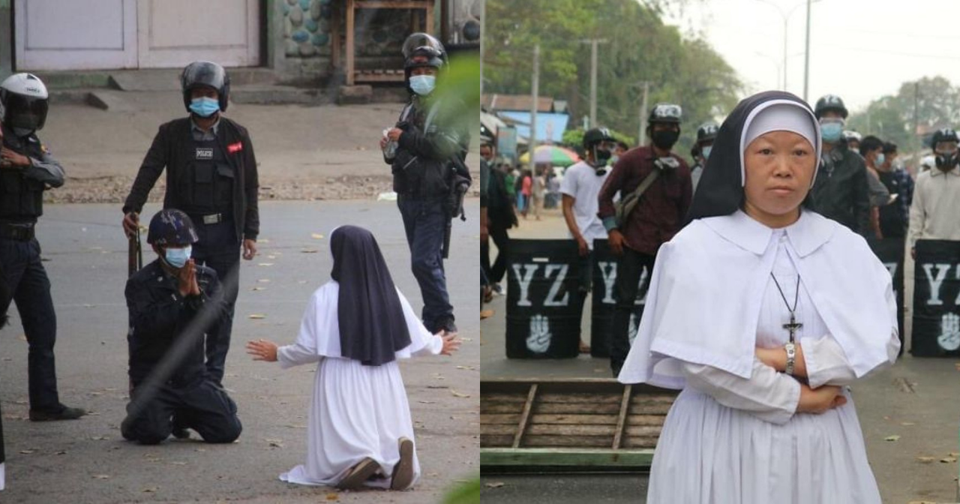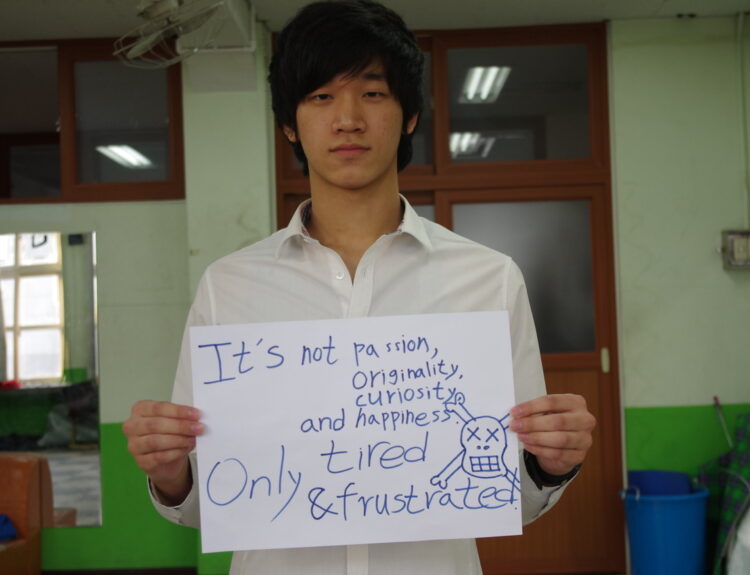Introduction: “Forgive them, for they know not what they do”
To the West, North Korea is a country antithetical in every way to the liberal democratic world order of the US hegemon. At worst, North Korea is full of evil, strange little Asian people who are hellbent on the destruction of American-style democracy and freedom, at best, they are poor, unfortunate victims of a repressive regime. Americans generously (and self-righteously) claim that the North Korean people themselves are not evil, but are merely brainwashed by their glorious leader and government (“forgive them, for they know not what they do”).
The fact that Americans call North Koreans brainwashed while unironically believing that their country is a beacon of liberty, freedom and democracy would be laughable if they weren’t backed by the biggest military power in the world. Which, by the way, yes, the US is the country with the highest military spending in the world, and has 750 military bases in 80 countries. It also has the second largest nuclear arsenal in the world and is the only country in the world that has ever detonated the atomic bomb as a weapon. Moreover, the US has infamously meddled in more than 80 foreign elections (Iran, Guatemala, Nicaragua, the Dominican Republic, Indonesia, Congo, Iraq…the list goes on), providing military support to groups that support their interests and funding coups and wars for their own economic benefit. For a country that loves democracy, it has dedicated a lot of time, resources and military strength in toppling the democracies of other countries. And isn’t it strange, nay even ironic, that a country so dedicated to freedom has the highest incarceration rate in the world? None of this is news, and yet there are still large swathes of the American population that earnestly parrot the aforementioned American exceptionalism propaganda.
Why, then, do we not consider Americans brainwashed the same way that we do countries like North Korea?
Brainwashing: That “mystical, Oriental practice”

Cold War Propaganda Ad, on Good Housekeeping Magazine. Source: Mr. Beaverhousen, licensed under CC BY-NC-SA 2.0.
Perhaps one reason is because the idea of “brainwashing” was an Orientalizing myth from the start. The term “brainwashing” was popularized by CIA-funded writer, Edward Hunter, in the 1950s during the peak of the Cold War. During the Korean War, thousands of American prisoners of war (POWs) signed petitions denouncing their own military and calling for an end to the war, with some soldiers even refusing to be repatriated. Faced with this strange phenomenon, Americans jumped to the only logical conclusion: China and the Soviet Union had developed mind control techniques. Rooted in Orientalist tropes, Hunter caricatured China and Russia as the “inscrutable Orient” and “robotic Soviets” and claimed that they had developed a method to turn people into “mindless, Communist automatons”.
Politically charged from the outset, the concept of brainwashing was developed to answer the question, “why would anybody become a Communist?” Surely, the only possible answer was that they were psychologically coerced using mysterious Oriental techniques. The answer to what was going on with the American POWs was of course, much simpler. Plain old torture likely accounted for the POWs radical change of hearts. But the concept of brainwashing had already seized the minds of the American population and went on to be hugely influential, particularly in the realm of the military. This CIA-backed “Orientalist propaganda fiction” was created to “mobilize domestic support for a massive military build-up”, and led to the infamous human experimentation program, MK-ULTRA, as well as new interrogation techniques during the war on terror.
North Korea: Fake tears and paid actors?
Though perhaps the sci-fi element of brainwashing has largely lost its sheen in the modern age, the Orientalizing underpinnings of this concept are still on full display, particularly in Western discourse on North Korea. When Kim Jong-il died in 2011, Westerners obsessively debated the authenticity of the North Korean public’s tears. Why would they cry, they asked, when they are victims of a totalitarian regime? Shouldn’t they be happy that the evil dictator that oppressed them is gone? It didn’t add up, so the West rationalized the tears of the “faceless masses” as a result of brainwashing and that old Orientalist trope of “Asian collectivism”. In liberal Western democracies (and liberal Western democracies only), individuals are gifted with subjectivity, and a rich, inner world. As such, crowds in the West are “‘the people’ in action” whereas in North Korea they are “oppressed automatons.”
In one of my classes on North Korea, a guest speaker showed us a photo of a North Korean beach. The photo is starkly different from what Western propaganda on North Korea usually depicts. There are no photos of the Great Leader, no soldiers marching lockstep in uniform, no children huddled and starving. In the photo, North Koreans are enjoying a day at the beach like normal human beings, and if it wasn’t pointed out to you, you’d be hard-pressed to even identify the location of the photo as North Korea. A student raised their hand and asked the guest speaker, “aren’t you worried that by sharing this photo you’re spreading state propaganda and giving people a skewed look at North Korea?”
The question shows a remarkable lack of consideration for the fact that they themselves may have been subjected to a relentless barrage of propaganda their entire lives. Surely, they do not actually think that Western media depictions of North Korea stem from an abstract, unerring desire for truth in investigative reporting? Or from altruistic humanitarian motivations to help the most unfortunate of the international community? This type of question reflects the odd unilateralism of the Western gaze.
Moreover, it’s reflective of a common view where people (especially Westerners), claim that all “normal” photos of North Korea are staged, with the people in the photos acting for the tourists. To think that an entire country functions as a set piece to deceive your Western gaze reflects an astonishing and frightening level of self-delusion. Is it perhaps not more feasible that North Koreans go to the beach, and live their normal lives as normal people who are trying to live and survive despite the flaws of their system? How exactly would it even be possible for a country’s population to live in rigid misery day in and day out for over 70 years? Do we not ourselves constantly live our normal lives in the midst of terrible poverty, violence and war? The desire to view North Korea as strangely alien and anachronistic, a country populated with helpless victims and brainwashed automatons, is not a fresh or new take, but merely a tired remix of familiar, Orientalist tropes.
Conclusion: “You Complete Me”

Wonsan (North Korea). Source: www.j-pics.info.
Many Westerners regurgitate these tired tropes and fixate on North Korea as a convenient foil that upholds the superiority of their own systems, while remaining woefully ignorant of the bipolar Cold War politics that created North Korea in the first place. North Korea was born from the battle between Communist and capitalism, and the idea of brainwashing was born from anti-Communism, namely the fear that good ol’ Americans could be brainwashed by the Asians and Russians to become Communist. Far from a figment of the past, this anti-Communist fear still persists in how the West discusses, depicts and treats North Korea (as well as in South Korea). A refusal to understand this is not only naïve, it’s a testament to how successful Western propaganda has been in brainwashing its subjects.
In The Dark Knight, the Joker says to Batman, “Kill you? I don’t wanna kill you. What would I do without you? […] you complete me” (emphasis added). Though Batman thinks that as the “good guy”, he exists at the opposite end of the spectrum from the Joker, the Joker collapses this gap between them, depicting their relationship as symbiotic. Our cultural mythology frequently depicts good and bad as polar opposites when more often than not, they exist in tension with one another. Not only are Batman and the Joker closer to each other than they appear, they actually need one another to survive. Is the US really so different from North Korea? Is North Korea really such an alien country, separate from the rest of the international order? If not, what purpose does it serve the US and the West to depict it this way? In essence, why does the West need North Korea? (A question, which if we broaden is: why does the West need the Orient?)
As James Baldwin said: “it has always been much easier (because it always seemed much safer) to give a name to the evil without than to locate the terror within.”
The truth is, evil is not elsewhere. It is not outside us, something we can easily excise. Bombing North Korea to smithereens will not eliminate evil from the Earth. Pointing the finger outward, saying that North Korea is crazy and its entire population is brainwashed, is easy and morally lazy. It also conveniently crops out both historical context and the role of the rest of the international community. But even more than that, it keeps us from locating “the terror within”. Is it only possible for certain countries to brainwash their populaces? Are only some people (white Westerners) the moral subjects and protagonists of history? Are Westerners freethinking individuals and North Koreans brainwashed automatons? Are we good, and North Koreans evil? To overcome this childishly simple, black and white view we must do many things, but the first is to look inward. It may be terrifying, but the alternative is far scarier.

- “I Love My Body”: Hwasa and Female Empowerment in K-Pop and Korean Society - May 6, 2025
- English Fever in South Korea - February 24, 2025
- South Korea’s Medical School Expansion – Cure Worse than the Disease? - October 20, 2024






